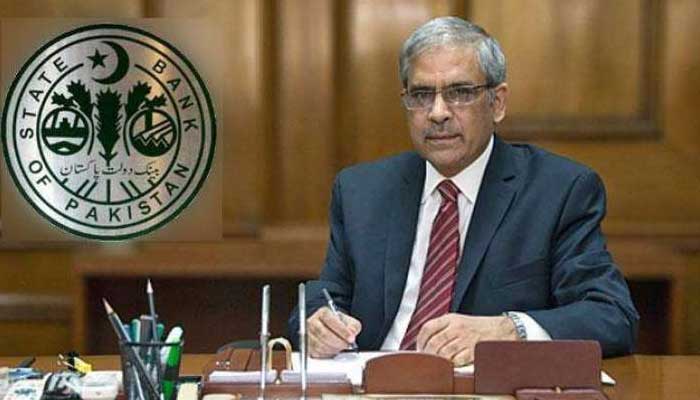Hard to manage if remittances fall below $20 bn: SBP governor
The governor SBP said that the remittances were playing an important role on account of macroeconomic front as the country could fetch exports close to $25 billion while imports of goods and services stood at $60 billion.
ISLAMABAD: Governor State Bank of Pakistan Tariq Bajwa has said it would be hard to manage Pakistan's economy if foreign remittances fall bellow the $20 billion mark.
“Just imagine if there will be no remittances, then the country’s economy will have become unmanageable keeping in view massive imbalances on external fronts,” Governor SBP Tariq Bajwa said while launching an online payment platform for remittances operated by Ant Financial Services in collaboration with Telenor Microfinance Bank and Valyou Malaysia here on Tuesday.
He said that the hundi/ hawala could be overcome through use of technology as it could help reducing cost and ensuring efficiency and convenience for providing remittances amount in real time.
The governor SBP said that the remittances were playing an important role on account of macroeconomic front as the country could fetch exports close to $25 billion while imports of goods and services stood at $60 billion. The remittances from abroad, he said, were ranging $20 billion, which stands at 80 percent of total exports of the country.
The remittances in percentage of GDP stood at 6 percent and if there would be no remittances, the country’s economy would have become unmanageable. He said that the use of technology could provide solutions but there was need to ensure cyber security, identification of users and making foolproof arrangements to foil cyber-attacks. He said that they decided to provide Rs 2 airtime to sender of each dollar through mobile wallet.
The Telenor Microfinance Bank, in partnership with Valyou of Malaysia, has introduced blockchain-based cross-border remittance service developed by Alipay, the online payment platform operated by Ant Financial Services Group (“Ant Financial”).
Governor State Bank of Pakistan Tariq Bajwa, while congratulating Ant Financial, Telenor Microfinance Bank, Valyou Malaysia and Standard Chartered Bank for this new initiative and collaboration to promote the use of formal remittance channels, said: “At around $20 billion per year, international remittances are important from the perspective of overall macroeconomic stability and their positive spillover in improving lives of millions of families. Home remittances contributed to over 6% in GDP, equivalent to over 50% of our trade deficit, 85% of exports and over one-third of imports during FY 2017-18.”
He also said that the Government of Pakistan and State Bank of Pakistan have taken a number of initiatives to promote the transfer of home remittances using formal financial channels and the new block-chain technology based remittance service would complement these efforts as transfer of cross-border remittances in near real time would bring convenience and facilitation for both remitters and their beneficiaries. “This puts Pakistan on the map of very few countries in the world that have launched International Remittance using block-chain technology”, he added.
The blockchain-powered remittance service will make round-the-clock, real-time money transfers between the two countries possible at a competitive exchange rate, with Alipay’s transaction fees waived during the one-year trial period.
“The new remittance service is one of the examples of how emerging technologies can help countries meet their digital and financial inclusion goals. We’re thrilled to be part of Pakistan’s financial inclusion efforts and we’re dedicated to exploring breakthroughs and applying them to benefit more people in more places,” said Eric Jing, Chairman and CEO of Ant Financial.
Starting from 2015, Alipay has formed nine strategic partnerships with local partners outside Mainland China. As of today, Alipay, together with its global partners, are serving over 1 billion active users globally.
-
 Travis Kelce Plays Key Role In Taylor Swift's 'Opalite' Remix
Travis Kelce Plays Key Role In Taylor Swift's 'Opalite' Remix -
 How Jennifer Aniston's 57th Birthday Went With Boyfriend Jim Curtis
How Jennifer Aniston's 57th Birthday Went With Boyfriend Jim Curtis -
 JoJo Siwa Shares Inspiring Words With Young Changemakers
JoJo Siwa Shares Inspiring Words With Young Changemakers -
 James Van Der Beek Loved Ones Breaks Silence After Fundraiser Hits $2.2M
James Van Der Beek Loved Ones Breaks Silence After Fundraiser Hits $2.2M -
 Disney’s $336m 'Snow White' Remake Ends With $170m Box Office Loss: Report
Disney’s $336m 'Snow White' Remake Ends With $170m Box Office Loss: Report -
 Travis Kelce's Mom Donna Kelce Breaks Silence On His Retirement Plans
Travis Kelce's Mom Donna Kelce Breaks Silence On His Retirement Plans -
 Premiere Date Of 'Spider-Noir' Featuring Nicolas Cage Announced
Premiere Date Of 'Spider-Noir' Featuring Nicolas Cage Announced -
 Pedro Pascal's Sister Reveals His Reaction To Her 'The Beauty' Role
Pedro Pascal's Sister Reveals His Reaction To Her 'The Beauty' Role -
 Kate Middleton Proves She's True 'children's Princess' With THIS Move
Kate Middleton Proves She's True 'children's Princess' With THIS Move -
 Paul Anka Reveals How He Raised Son Ethan Differently From His Daughters
Paul Anka Reveals How He Raised Son Ethan Differently From His Daughters -
 'A Very Special Visitor' Meets Queen Camilla At Clarence House
'A Very Special Visitor' Meets Queen Camilla At Clarence House -
 Jodie Turner Smith Shares One Strict Rule She Follows As A Mom
Jodie Turner Smith Shares One Strict Rule She Follows As A Mom -
 Hailey Bieber Reveals KEY To Balancing Motherhood With Career
Hailey Bieber Reveals KEY To Balancing Motherhood With Career -
 Photo Of Jay-Z, Other Prominent Figures With Jeffrey Epstein Proven To Be Fake
Photo Of Jay-Z, Other Prominent Figures With Jeffrey Epstein Proven To Be Fake -
 Hillary Clinton's Munich Train Video Sparks Conspiracy Theories
Hillary Clinton's Munich Train Video Sparks Conspiracy Theories -
 Fans Slam Talk Show Host For 'cringe' Behavior In Chris Hemsworth Interview
Fans Slam Talk Show Host For 'cringe' Behavior In Chris Hemsworth Interview




